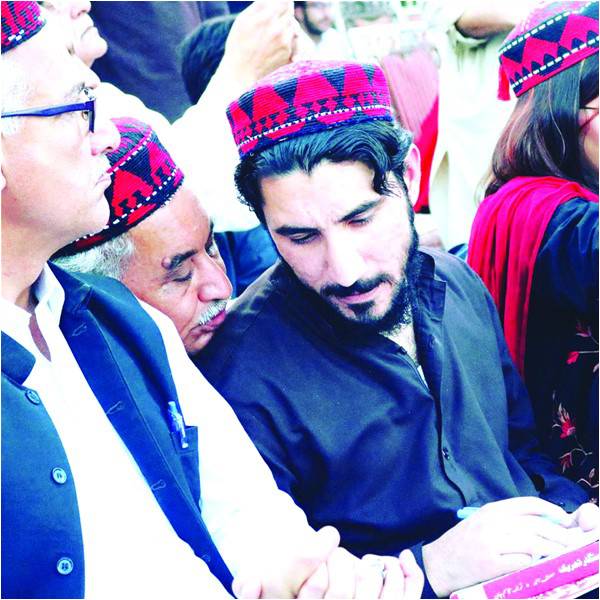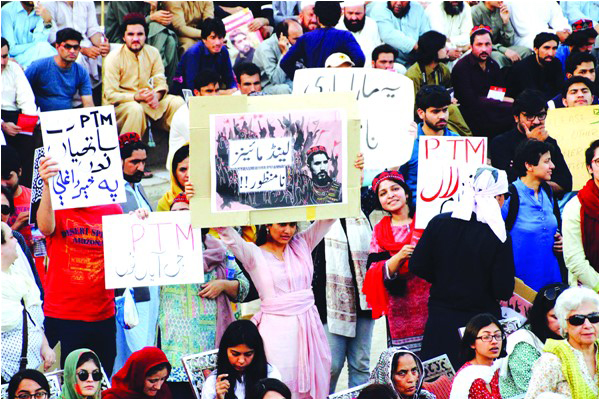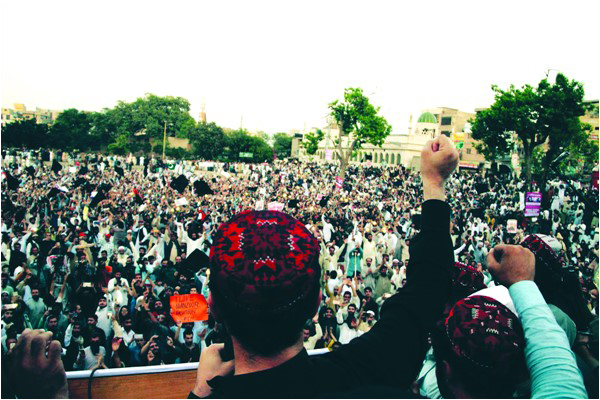
On an average day, Mochi Gate Park is an unremarkable plot of land where young people gather to socialize when they feel the need to escape from their cramped living quarters in one of the oldest parts of Lahore. There is no grass to walk on or swings for children to play on or even benches to sit. There is a raised dais at one end of the ground which hints at its use as a stage if someone were to make a speech here. On most days, sewage surrounds this dais, discouraging any such ideas.
On Sunday, April 22, when a group of young men supporting the Pashtun Tahaffuz Movement arrived at the ground to begin preparations for a demonstration at the site later in the afternoon, they were horrified. Besides the usual sewage pouring out from open gutters, there were heaps of garbage strewn across the ground. A foul smell, the cumulative effect of all the waste, engulfed the area.
To the young activists, who had spent the previous night nervously waiting for the group’s leaders to be released from police custody, this was sabotage by the local administration. Lahore was proving to be a difficult place to introduce their burgeoning movement. Earlier, the administration had revoked permission for the demonstration citing security concerns and when the PTM leadership, supported by the Lahore Left Front, decided to go ahead with the event, a group of policemen barged into their hotel room during a meeting and detained them. They were taken to a police station where they were questioned about the nature of their event and were asked to provide reassurances that nothing would be spoken on stage that could be deemed anti-Pakistan. They were released after a few hours, but this was a time of great uncertainty, fear and confusion for the supporters and sympathisers of the PTM, for they had spent days in the streets of Lahore, putting up posters and distributing pamphlets to invite the public to their event.
Dismayed, but not disheartened, the young men set to work, but not before taking a few pictures of the ground to post on Twitter. They dug up dirt, moved it to the wet parts of the ground and covered it. They took away the trash and hung posters and banners around the ground to mask its ugliness and to make it more welcoming. They cleaned up the dais, put up carpets and chairs there. A sound system was set up and the young men watched as police arrived and began setting up layers of security around the site. Within a few hours, as early arrivals began to reach, the ground had transformed. It appeared cleaner and organised, ready to welcome the thousands who were to gather here.

By 4.30pm, there were several thousand people in the area. Hundreds of black and white flags, moving rhythmically to the tune of PTM’s anthem Da Sanga Azadi Da (What kind of freedom is this?), dotted the scene. The white flags spoke of the peaceful intentions of the movement and the black ones represented its protest. Through these fluttering flags, one could spot flashes of blue and red – pictures and posters of those who were missing, or those who had been killed, and slogans of scores of other struggles tied to this movement.
The people at the demonstration were predominantly Pashtuns from working class backgrounds. There were many young students among them who were managing the event; from organising the crowd in neat rows to distributing water among the participants, to facilitating journalists. But they were not alone; many Punjabis sat among them in solidarity. The fiery women of the Anjuman Mazareen Punjab sat under the shade of a huge banner. They were carrying placards of their own missing people. They were flanked by members of the Women Action Forum and friends and supporters of the Find Raza campaign. Teachers and professors from various public and private sector universities of Lahore were also present.
The crowd was predominantly male, but as later several women also mentioned on Twitter, the space was not hostile to women. One journalist commented on how this was different from other demonstrations she had been to; there was no groping or leering that she had become accustomed to in large public meetings.
The mood was somber, perhaps because the issues at hand were of grave nature. Occasionally, slogans would erupt from the crowd and reverberate across the ground. It was during one of these rounds of sloganeering that Manzoor Pashteen, the face of the movement, arrived at the venue and the sloganeering turned into a roar of approval and excitement. Surrounded by a team of young Pashtun men who were providing him security, he was escorted to the dais - now a grand stage - and a wave of excitement was experienced by everyone present as they caught a glimpse of Pashteen for the first time. He waved shyly and then sat down, burying his head in the final draft of his speech.

Pashteen took to the stage after several rounds of speeches and introduced the PTM’s message to the people of Lahore; that of peaceful resistance, of dignity and fundamental human rights.
“The whole country has seen the result of PTM’s first demand: the arrest of former SSP Malir Rao Anwar. Today, even the court is saying that Anwar is a terrorist and Naqeebullah Mehsud was innocent.”
He narrated stories of innocent people who were killed in the Federally Administered Tribal Areas. Referring to a recent claim by Justice Javed Iqbal, the head of the missing persons commission, who had accused former president Pervez Musharraf of handing over 4,000 Pakistanis to United States, Pashteen said, “When they can sell 4,000 people, they can do a lot more. We demand that we be told the amount for which they were sold. We will collect the money and give it to you so you can bring them back. We are not asking you to not release them, just give them to the courts if they have committed a crime.”
He also demanded that first information reports against students in Lahore, who were PTM supporters, be withdrawn. “We are very peaceful but do not forget that we are young, and young people do not have a lot of patience.”
As he was speaking, with the crowd listening with rapt attention, there was commotion near the stage. Upon closer inspection, one could see waste water once again pouring out from the gutter. The young men protecting the stage scattered and began covering up the rapidly-flooding area with paper, dirt, anything they could get their hands on.
“Look, they have released waste near the stage and our people are cleaning it up. This has an interesting parallel with history; our rulers make a mess and leave it to us to clean it up. But now that we have risen up against oppression, we are not afraid,” he said.
Pashteen announced that the next stop for the movement would be Swat following which a gathering would be held in Karachi on May 12.
Earlier, Tahira Jalib, daughter of revolutionary poet Habib Jalib had also spoken at the event. She read out Dastoor, a famous poem by Jalib. Amina Masood Janjua of the Defence of Human Rights Pakistan, whose husband has been missing since 2005, was also present.
Advocate Fazal Khan, father of a student killed in the 2014 Army Public School attack in Peshawar made passionate speech where he repeated his demand for the formation a judicial commission to investigate the attack.
Awami Workers Party President Fanoos Gujjar spoke of the harassment faced by activists for their support for the movement. “Yesterday when PTM leaders were detained, we were told that Lahore was a peaceful city and that we were anti-state traitors. What will the traitors do here, they asked us. Pakhtuns here are studying and conducting trade. Why are you taking their peace away?”
He then dismissed the idea that all Pakhtuns in the Punjab were living in contentment. “Pakhtuns in the Punjab face atrocities at the hands of the Punjab Police which extorts money from labourers. Many people are picked up in broad daylight from Lahore. And what about those who are killed in fake encounters here?”
PTM central leader Ali Wazir said, “The movement has come to Lahore so that if something happens in the future, nobody can say we did not reach out to them.”
On Sunday, April 22, when a group of young men supporting the Pashtun Tahaffuz Movement arrived at the ground to begin preparations for a demonstration at the site later in the afternoon, they were horrified. Besides the usual sewage pouring out from open gutters, there were heaps of garbage strewn across the ground. A foul smell, the cumulative effect of all the waste, engulfed the area.
Pashteen has announced that the next stop for PTM would be Swat and later a gathering in Karachi on May 12
To the young activists, who had spent the previous night nervously waiting for the group’s leaders to be released from police custody, this was sabotage by the local administration. Lahore was proving to be a difficult place to introduce their burgeoning movement. Earlier, the administration had revoked permission for the demonstration citing security concerns and when the PTM leadership, supported by the Lahore Left Front, decided to go ahead with the event, a group of policemen barged into their hotel room during a meeting and detained them. They were taken to a police station where they were questioned about the nature of their event and were asked to provide reassurances that nothing would be spoken on stage that could be deemed anti-Pakistan. They were released after a few hours, but this was a time of great uncertainty, fear and confusion for the supporters and sympathisers of the PTM, for they had spent days in the streets of Lahore, putting up posters and distributing pamphlets to invite the public to their event.
Dismayed, but not disheartened, the young men set to work, but not before taking a few pictures of the ground to post on Twitter. They dug up dirt, moved it to the wet parts of the ground and covered it. They took away the trash and hung posters and banners around the ground to mask its ugliness and to make it more welcoming. They cleaned up the dais, put up carpets and chairs there. A sound system was set up and the young men watched as police arrived and began setting up layers of security around the site. Within a few hours, as early arrivals began to reach, the ground had transformed. It appeared cleaner and organised, ready to welcome the thousands who were to gather here.

By 4.30pm, there were several thousand people in the area. Hundreds of black and white flags, moving rhythmically to the tune of PTM’s anthem Da Sanga Azadi Da (What kind of freedom is this?), dotted the scene. The white flags spoke of the peaceful intentions of the movement and the black ones represented its protest. Through these fluttering flags, one could spot flashes of blue and red – pictures and posters of those who were missing, or those who had been killed, and slogans of scores of other struggles tied to this movement.
The people at the demonstration were predominantly Pashtuns from working class backgrounds. There were many young students among them who were managing the event; from organising the crowd in neat rows to distributing water among the participants, to facilitating journalists. But they were not alone; many Punjabis sat among them in solidarity. The fiery women of the Anjuman Mazareen Punjab sat under the shade of a huge banner. They were carrying placards of their own missing people. They were flanked by members of the Women Action Forum and friends and supporters of the Find Raza campaign. Teachers and professors from various public and private sector universities of Lahore were also present.
The crowd was predominantly male, but as later several women also mentioned on Twitter, the space was not hostile to women. One journalist commented on how this was different from other demonstrations she had been to; there was no groping or leering that she had become accustomed to in large public meetings.
The mood was somber, perhaps because the issues at hand were of grave nature. Occasionally, slogans would erupt from the crowd and reverberate across the ground. It was during one of these rounds of sloganeering that Manzoor Pashteen, the face of the movement, arrived at the venue and the sloganeering turned into a roar of approval and excitement. Surrounded by a team of young Pashtun men who were providing him security, he was escorted to the dais - now a grand stage - and a wave of excitement was experienced by everyone present as they caught a glimpse of Pashteen for the first time. He waved shyly and then sat down, burying his head in the final draft of his speech.

Pashteen took to the stage after several rounds of speeches and introduced the PTM’s message to the people of Lahore; that of peaceful resistance, of dignity and fundamental human rights.
“The whole country has seen the result of PTM’s first demand: the arrest of former SSP Malir Rao Anwar. Today, even the court is saying that Anwar is a terrorist and Naqeebullah Mehsud was innocent.”
He narrated stories of innocent people who were killed in the Federally Administered Tribal Areas. Referring to a recent claim by Justice Javed Iqbal, the head of the missing persons commission, who had accused former president Pervez Musharraf of handing over 4,000 Pakistanis to United States, Pashteen said, “When they can sell 4,000 people, they can do a lot more. We demand that we be told the amount for which they were sold. We will collect the money and give it to you so you can bring them back. We are not asking you to not release them, just give them to the courts if they have committed a crime.”
He also demanded that first information reports against students in Lahore, who were PTM supporters, be withdrawn. “We are very peaceful but do not forget that we are young, and young people do not have a lot of patience.”
As he was speaking, with the crowd listening with rapt attention, there was commotion near the stage. Upon closer inspection, one could see waste water once again pouring out from the gutter. The young men protecting the stage scattered and began covering up the rapidly-flooding area with paper, dirt, anything they could get their hands on.
“Look, they have released waste near the stage and our people are cleaning it up. This has an interesting parallel with history; our rulers make a mess and leave it to us to clean it up. But now that we have risen up against oppression, we are not afraid,” he said.
Pashteen announced that the next stop for the movement would be Swat following which a gathering would be held in Karachi on May 12.
Earlier, Tahira Jalib, daughter of revolutionary poet Habib Jalib had also spoken at the event. She read out Dastoor, a famous poem by Jalib. Amina Masood Janjua of the Defence of Human Rights Pakistan, whose husband has been missing since 2005, was also present.
Advocate Fazal Khan, father of a student killed in the 2014 Army Public School attack in Peshawar made passionate speech where he repeated his demand for the formation a judicial commission to investigate the attack.
Awami Workers Party President Fanoos Gujjar spoke of the harassment faced by activists for their support for the movement. “Yesterday when PTM leaders were detained, we were told that Lahore was a peaceful city and that we were anti-state traitors. What will the traitors do here, they asked us. Pakhtuns here are studying and conducting trade. Why are you taking their peace away?”
He then dismissed the idea that all Pakhtuns in the Punjab were living in contentment. “Pakhtuns in the Punjab face atrocities at the hands of the Punjab Police which extorts money from labourers. Many people are picked up in broad daylight from Lahore. And what about those who are killed in fake encounters here?”
PTM central leader Ali Wazir said, “The movement has come to Lahore so that if something happens in the future, nobody can say we did not reach out to them.”

